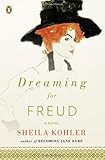Freudian Psychology
Why Does the Dora Case Read Like a Soap Opera?
Narrative technique in the Dora case
Posted September 18, 2014
In this case history, Freud addresses us directly and clearly. He talks to us and acknowledges our doubts and possible reactions to his words. He makes sweeping statements about human nature which we may question or accept: “the psychoneuroses are the negative of perversions,” he says. And “for the wish which creates the dream always springs from childhood and it is continually trying to summon childhood back into reality and to correct the present day by the measure of childhood.”
He uses rich imagery, quotes from the Gospel (putting new wine into old bottles) from Greek mythology (Medea and Creusa) and speaks of neurosis as the damming of a river bed.
He creates mystery from the start: sparking our interest by telling us he has chosen a patient whose identity he can easily hide as she lives in “a remote provincial town,” that he has disguised all names, and that the therapy has been incomplete because the patient has left. Without the knowledge of dream interpretation we will not be able to understand this case, he maintains.
He speaks with much authority, as though he knows all, and though we find him often arrogant and intensely annoying when he bullies this poor young woman, we cannot but be impressed with his brilliance as he skillfully intertwines his radical theories with the life of this girl, giving us sufficient “gossip,” frank sexual details and shocking interpretations to keep our attention, all juxtaposed with his novel theories.
Cleverly he says if he were writing fiction he would leave out the fact that Dora was not only in love with Herr K., but also Frau K., Dora’s father’s mistress.
Thus he creates an interesting inner conflict : Dora is in love with the whole couple, the man and the woman, her “adorable white body” and behind this is the love for Dora’s father who has promoted this relationship for his own ends. All three of these adults betray Dora in varying and horrifying ways.
Freud creates suspense by putting this young woman in such a dangerous situation. The stakes are high here: life and death. Dora has already written a suicide note; her father supposedly threatens to kill himself; the young girl is repeatedly sexually harassed by Herr K., who is married to her father’s mistress. He assaults her in a darkened office, having given his employees the day off, and then later makes a declaration of love by a lake using the identical words he has used with the governess of his children.
And Freud brings all of this to a happy conclusion. On a spring day, in 1902, Dora comes back to ask him to take her once more in his care. She tells him that the Ks have apologized and admitted their faults. Freud, in the meantime has acquired the professorship he has coveted, and he gets his revenge, refusing to take Dora back in his care. Dora, though, will later marry and bear a child she adores.
Sheila Kohler is the author of many books including Becoming Jane Eyre and the recent Dreaming for Freud.
Becoming Jane Eyre: A Novel (Penguin Original) by Sheila Kohler Penguin Books click here
Dreaming for Freud: A Novel by Sheila Kohler Penguin Books click here




